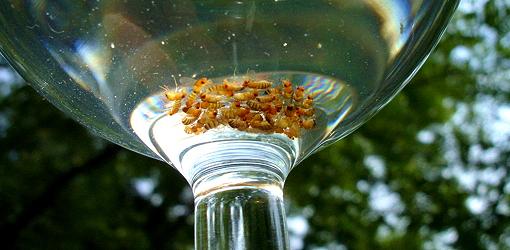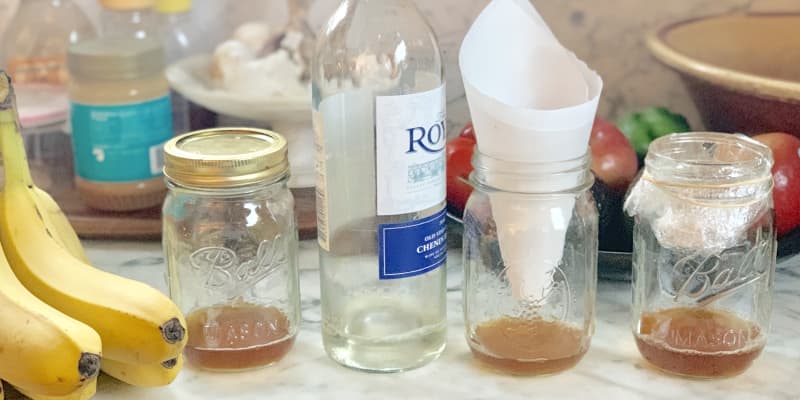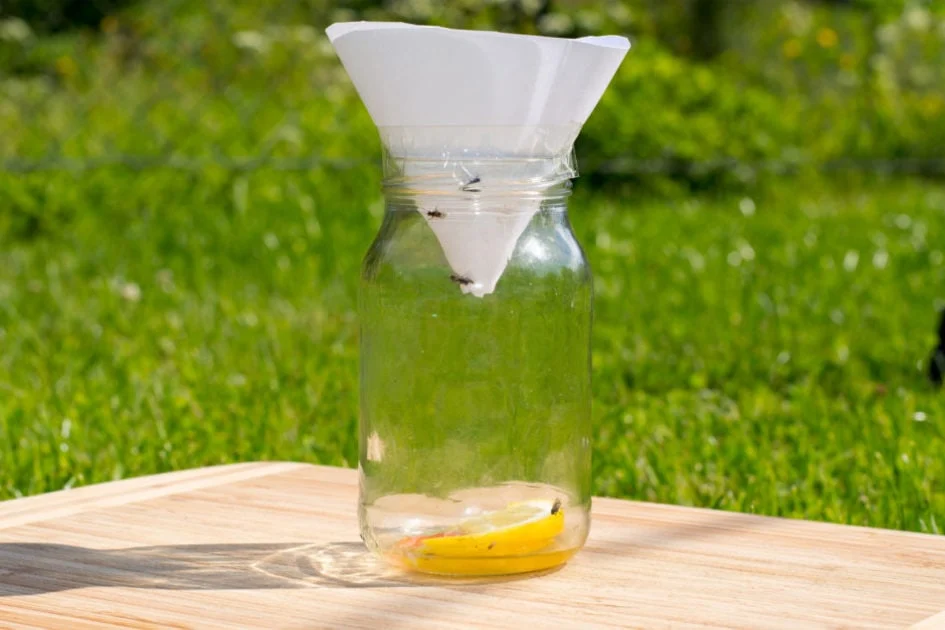Overview
Although gnats are small, they have a potential of making a huge mess in your house. Major attraction of these tiny flying insects which are commonly discovered around fruits, houseplants, drains or trash cans are moist rotting organic substances. Luckily, there is no necessity in costly commercial products, DIY traps are easy, inexpensive and optimal.
In this guide we will discuss a few of these homemade traps, step by step procedures, and a few precautions, and long term prevention measures.
What Are Gnats and Why Are They a Problem?
Gnats are minute insects, in winged form, belonging to the fungus gnat or fruit fly families. They do not bite and cause significant damage but it is both annoying and unhygienic since they are easily found in the kitchen and bathrooms. They multiply quickly and they lay their eggs in moist soil or rotting fruits or organic waste.
Common types:
- Fungus gnats: They are in plant soil.
- Fruit flies: They are attracted to fermenting fruits and sweet fluids.
- Drain flies: Are present under sinks and drains of the bathroom.
Why Choose DIY Gnat Traps?
Homemade gnat traps are:
- economical: comprises plain household ingredients.
- Non-toxic: Paint is safe on pets and children (with caution used).
- Adaptability: Depending on the location where gnats are nesting you can have custom traps.
- Environment friendly: Reuse containers and toxic harmfulness chemicals.
1. Apple Cider Vinegar Gnat Trap
Best for: Fruit flies in kitchens
Materials:
- Small bowl or cup
- Apple cider vinegar
- Dish soap
- Plastic wrap (optional)
- Rubber band (optional)
Instructions:
- Add half of Apple cider vinegar to the bowl.
- Put in several drops of dish soap and swirl.
- It is optional and using plastic wrap and then securing them with a rubber band covers the bowl.
- Use a toothpick to poke tiny holes on the plastic wrap.
How it works:
The dish soap ruptures the surface tension to make the gnats drown due to vinegar scent that appeals to them.

2. Overripe Fruit Trap
Best for: Gnats around fruit baskets or compost bins
Materials:
- Jar or bowl
- A piece of overripe fruit (banana, peach, etc.)
- Plastic wrap
- Toothpick or fork
Instructions:
- Put the fruit in a bowl or in a jar.
- Lay plastic on the top of the container.
- Poke some small holes on the top.
How it works:
Gnats crawl in through the holes, lured by the fruit, but they can’t find their way out.
3. Wine or Beer Trap
Best for: Kitchens or near trash cans
Materials:
- Small glass or cup
- Leftover wine or beer
- Dish soap
Instructions:
- Add in the glass half a cup of wine or beer.
- Place a bit or two of dish soap and stir up.
- Exposure to uninhabited places close to the affected area.
How it works:
Gnats are drawn to the fermented scent. Dish soap causes them to sink and drown.
4. Sticky Paper Trap
Best for: Gnats near plants or windows
Materials:
- Yellow index cards or construction paper
- Corn syrup or petroleum jelly
- Toothpicks or small stakes
Instructions:
- Cut the yellow paper into 3×5-inch pieces.
- Coat one side with a sticky substance.
- Attach to toothpicks and place them in plant pots or hang near gnat hotspots.
How it works:
Gnats are naturally attracted to yellow. They land on the sticky surface and get trapped.

5. DIY Candle Trap
Best for: Nighttime gnat control
Materials:
- A shallow dish or tray
- Water
- Candle
- Matches/lighter
Instructions:
- Fill the tray with water and place a candle in the center.
- Light the candle and turn off the lights.
- Leave it overnight.
How it works:
Gnats are drawn into the flame during night. They fly there and burn or fall in the water and drown.
Warning: Never walk away without putting off a candle.
How to Harvest Rhubarb | A Complete Gardener’s Guide
6. Vinegar and Baking Soda Drain Cleaner
Best for: Drain flies in sinks
Materials:
- ½ cup baking soda
- 1 cup vinegar
- Hot water
Instructions:
- Pour baking soda down the drain.
- Follow with vinegar.
- Let it fizz for 15 minutes.
- Pour boiling water to flush.
How it works:
This breaks down organic buildup in drains, killing gnat eggs and larvae.
Bonus Bottle Funnel Trap
Best for: Multipurpose gnat removal
Materials:
- Empty plastic bottle
- Vinegar or overripe fruit
- Scissors
- Tape
Instructions:
- Cut the top third of the bottle off.
- Invert the top piece to form a funnel.
- Add vinegar or fruit inside the bottle.
- Tape the funnel to the base.
How it works:
Gnats enter easily but can’t escape the funnel’s narrow opening.
Safety Tips for DIY Gnat Traps
- Do not leave where they can be accessed by children or domestic pets particularly when using vinegar, soap or candles.
- Label The traps when in close proximity to food.
- Clean out and remove contents on a regular basis to avoid accumulation of odor.
- Do not go anywhere near open flames unless supervised.
:max_bytes(150000):strip_icc()/Fruit-Fly-Trap-What-You-Need-Photo-by-Vanessa-Greaves-650x465-a49ab4cfe72d4fc8ad6594f56799fb07.jpg)
Long Term Gnat Prevention Tips
Traps work well, but prevention is key to breaking the breeding cycle.
1. Store Fruits in a Proper Way
- Place fruits that are ripe in the refrigerator.
- Get rid of any spoil or fermentation of produce immediately.
2. Clean Sinks And Drains
- Weekly apply vinegar and baking soda.
- Take bad towels or wet sponges off the sink.
3. Water Plants Correctly
- Let soil dry between waterings.
- Use sterile potting mix to reduce fungus gnat risks.
4. Take Out Trash Frequently
- Clean trash bins regularly.
- Seal trash bags tightly.
5. Eliminate Standing Water
- Clean bowls, trays and saucers used by pets every day by drying them.
- Repair leaking sinks and or appliances.
When to Consider Professional Help
If you’ve tried multiple DIY traps and still have a gnat infestation, it may be time to:
- Check for mold or structural dampness.
- Call a pest control professional.
- Replace plant soil or assess for drain damage.
Conclusion
A DIY gnat trap is an inexpensive clever method to deal with a gnat issue in your house. No matter what insect you are trying to capture, be it fruit flies in your kitchen or fungus gnats around your house plants, there is a trap that best fits your requirements. Use several traps to get an immediate effect and use prevention methods to make your home gnat free forever.

